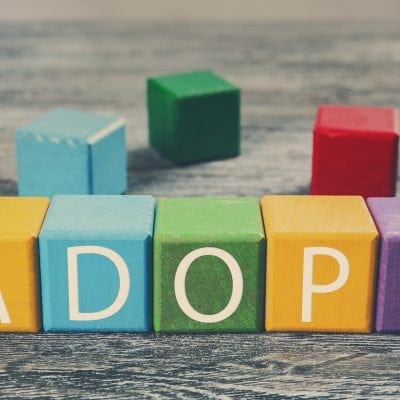It takes a special person to offer the lifelong gift of permanency to a child in need of a place to belong. Families who wish to welcome children or teens into their homes through adoption will discover there are many avenues to adoption. Primarily, adoptions fall into two categories: private adoption and adoption from foster care.
Private adoption occurs outside the public child welfare system and can be arranged through a private agency or an attorney (known as independent adoption). Private adoptions can occur domestically (for children residing within the United States) or internationally, which involves the adoption of a child from outside the U.S., including refugees and unaccompanied minors. Adoption from foster care involves working with a public child welfare agency or state-contracted private agency to identify children in foster care who are waiting for adoptive homes. DePaul Community Resources specializes in adoption from foster care; our Adoption program is dedicated to achieving permanency for children and teens in foster care who are in need of forever families.
Before beginning the adoption journey, prospective parents should be aware of the costs of adoption and available resources to help make the adoption process more affordable. Adopting a child from foster care involves minimal expense, while private adoptions tend to be considerably more expensive. This is due to Federal and State adoption assistance programs which minimize financial obstacles and encourage the placement of children whose special needs or circumstances might make them more difficult to place (such as older youth, sibling groups, or children with specific medical or mental health issues). Families adopting a child from foster care may be eligible for the following:
- Federal Adoption Assistance: Title IV-E of the Social Security Act provides for assistance to families adopting eligible children from foster care in two forms: 1) a one-time, nonrecurring reimbursement for adoption transaction costs; and 2) recurring monthly payments for the child’s care.
- Nonrecurring Expenses: Title IV-E also provides funding to states to reimburse families for certain expenses that the law defines as “reasonable and necessary adoption fees,” such as the costs of the required home study, court costs, and attorney’s fees.
- Recurring Monthly Payments: Title IV-E also provides financial assistance for eligible adoptions in the form of monthly payments to help cover a child’s care until he or she turns 18 (or age 21 in some states). The maximum amount paid may not exceed the amount the State would pay to maintain the child in foster care.
- State Adoption Assistance: These programs may be available for children with special needs who are not eligible under Federal title IV-E. State adoption assistance includes health insurance coverage under Medicaid or other medical assistance to cover some or all of the child’s medical needs, including special education, therapy, and rehabilitation.
By comparison, private adoption outside the public welfare agency—whether through a private agency, facilitated by an attorney, or occurring internationally—can incur significant expense.
- Private agency adoption costs vary widely based on the agency used and the individual adoption circumstances, but may range from $20,000 to $45,000. Overall costs may include the home study, court and legal fees, pre-adoption and post-adoption counseling for birth parents, birth parent medical and legal expenses, adoptive parent preparation and training, social work services needed to match a child with a prospective family, interim care for a child, and post-placement supervision until the adoption is finalized.
- Independent adoptions (assisted by an attorney) may range from approximately $15,000 to $40,000. This range may include the home study, the birth mother’s medical expenses, and separate legal and court fees for representing both adoptive and birth parents. There may be additional costs if complications arise during the birth process or if the search for expectant parents involves advertising.
- Intercountry adoption fees differ widely from country to country. Costs tend to be higher than for domestic adoptions because they may include foreign travel and immigration processing in addition to court costs, mandatory adoption education for prospective adoptive parents, and related documentation. Average costs may run between $20,000 and $50,000.
At DePaul, we are always looking for compassionate individuals who want to open their homes and their hearts to children and teens in need. If you are interested in adopting a child from foster care, please contact your nearest DePaul location to speak with one of our resource family specialists.
Information appearing in this article is courtesy of Child Welfare Information Gateway. Learn more at www.childwelfare.gov or visit www.adoptuskids.org to read more about adopting a child from foster care.
Read More: Become an Adoptive Parent
Read More: Support After an Adoption
Read More: Adoption FAQs

